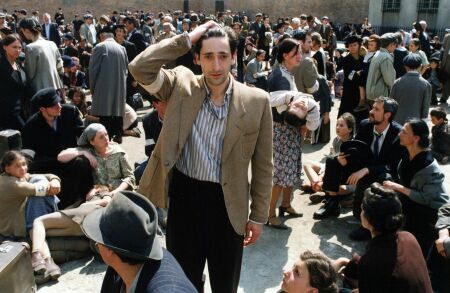Starring Adrien Brody, Thomas Kretschmann, Frank Finlay, Maureen Lipman, Emilia Fox,
Ed Stoppard, Julia Rayner, Jessica Kate Meyer, Ruth Platt.
Directed by Roman Polanski.
Featuring the life of Polish pianist and composer Wladyslaw Szpilman, Szpilman was
the last person heard on Polish radio in 1939, narrowly escaping German bombing as
he played the piano on the air. The Pianist follows his journey from the
start of German occupation in late 1939, to his forced journey to the Jewish Warsaw
Ghetto in October 1940. We see his escape from the ghetto
in early 1943, hiding in apartments with help from former Polish musician friends, just
before the Warsaw Ghetto uprising of April 1943, to his hiding in bombed out Warsaw
homes after the Warsaw uprising of 1944.
Filmed in Poland, it is Polish director Roman Polanski's first film he's made there
since in 40 years. Polanski was himself a war survivor, escaping the Cracow ghetto at
the age of 7. The Pianist is a moving and powerful story, devoid of histrionics
and excessive melodrama, instead told simply and eloquently. The film
illustrates the power of music, how dreaming about it helped Szpilman survive as he
was couped up and hiding. It shows Szpilman's will to live, how he heartbreakingly
watched as his entire family were sent to Treblinka, and spent the rest of the war
scrounging for food, begging for help from whomever would provide it. It is also
about the courage to stand against evil, where a mild-mannered, gentle musician must
go against his nature and fight for his life. It forcefully shows how the Jewish
citizens of Warsaw continuously thought all this would blow over, that co-operation
with the German occupiers would satisfy them and prevent them from desiring further
harm upon the Jews. But not until years later did the Jews, and the Poles, come to the
realization that "it is better to die with dignity" than put up with Nazi oppression
and meekly be shipped to a concentration camp slaughter, as 300,000 fellow Jews did
previous to the Warsaw Ghetto uprising. Yet it is a credit to the
movie that it takes pains to show there are good Germans as well as bad, good Poles
as well as bad, and even bad Jews among the good.
I'm not sure how much budget Polanski was afforded, but the cinematography in the Jewish
ghetto and in Warsaw after the 1944 uprising is breathtaking. And the performances,
ranging from the deserving Oscar-nominated Adrien Brody as Szpilman, to Thomas Kretschmann,
the decent German family-man officer who helped Szpilman at the close of the war.
We learn at the end of the film of the German officer dying in a Russian labour camp
a full 7 years after the war, and that German persons also suffered misery and horrors
because of the Nazis and World War II.
The Pianist is a remarkable, beautifully made movie. Despite the story being
about horrific events, the movie is surprising hopeful, not the downer one might expect
from such serious subject matter. I highly recommend it.
    
If you would like to respond, please click the
E-Mail

Press Here To Go To The Review List Page
|













